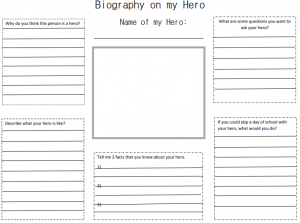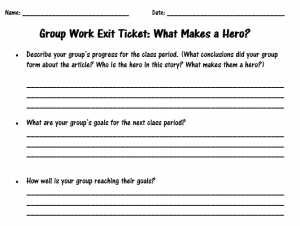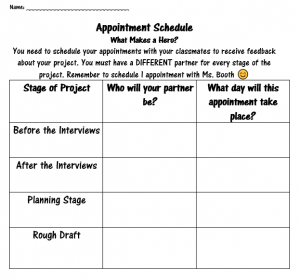What Makes a Hero?
Key Knowledge, Understanding and Success Skills
- RL.4.1 Refer to details and examples in a text when explaining what the text says explicitly and when drawing inferences from the text.
- RL.4.3 Describe in depth a character, setting, or event in a story or drama, drawing on specific details in the text (e.g., a character’s thoughts, words, or actions).
- RI.4.1 Refer to details and examples in a text when explaining what the text says explicitly and when drawing inferences from the text
- RI.4.2 Analyze informational text development. a. Determine the main idea of a text and explain how it is supported by key details. b. Provide a summary of the text that includes the main idea and key details, as well as other important information.
- RI.4.6 Compare and contrast a firsthand and secondhand account of the same event or topic; describe the differences in perspective and the information provided.
- RI.4.8 Explain how an author uses evidence to support particular points in a text.
- RI.4.9 Integrate information from two texts on the same topic in order to write or speak about the subject knowledgeably.
- W.4.1 Write opinion pieces on topics or texts, supporting a point of view with reasons and information.
- W.4.4 Produce clear and coherent writing in which the development and organization are appropriate to task, purpose, and audience.
- W.4.5 With guidance and support from peers and adults, develop and strengthen writing as needed by planning, revising, and editing.
- SL.4.3 Identify the reasons and evidence a speaker provides to support particular points.
- SL.4.4 Report on a topic or text, tell a story, or recount an experience in an organized manner, using appropriate facts and relevant, descriptive details to support main ideas or themes; speak clearly at an understandable pace.
- 21st Century Skills: critical thinking, collaboration, self-management
Challenging Problem or Question?
- What makes a hero?
Sustained Inquiry
- Students will analyze multiple informational resources about different types of heroes such as:
- Students will also analyze fictional resources about heroes including superheroes and fictional stories that include characters who can be seen as heroes such as:
- Wonder by R.J. Palacio
- Comic Books
- Matilda by Roald Dahl
- Students will examine firsthand and secondhand accounts about heroes to examine different perspectives of the same event.
- Students will reflect on videos such as the following:
- I will have local heroes/first responders come speak to the students about their experiences. The students will have to have questions ready to ask their guest speakers.
- Students will have to choose one person who they see as a hero. They will have to interview that person and interview others about their chosen hero to investigate why others may see them as a hero as well. Students may select their parent, sibling, grandparent, coach, mentor, teacher, friend, etc. Students will then create a report and poster about their hero. Students will have to present these to the class and a panel made up of other teachers, administrators, and the guest speakers who previously came to the class. (The planning page for the students to start brainstorming this process would look similar to the document below. The full document can be found on the Teachers Pay Teachers website, however I would modify this document to encompass the material I would like the students to cover in their project.)

Authenticity
- This project is authentic because this project relates to their own lives. The students are able to choose someone who has had an impact on their own life. This project has the students analyzing articles about real life heroes and kids just like them. The students are also able to work on their interviewing skills, collaborating with their peers, and how to present their information to others.
Student Voice & Choice
- Students will be able to decide what questions they would like to ask the guest speakers in class.
- The students will be allowed to choose anyone for their final project as long as they see that person as a hero and can provide evidence to support why that person is a hero. Students will have a list of questions they must ask the hero they are interviewing for their final project and the students will have to create their own questions as well.
Reflection
- When the students analyze the informational/fictional texts, they will be working independently and then as a group. The students will have to complete an exit slip after every class answering the following questions:
- Describe your group’s progress for the class period. (What conclusions did your group form about the article? Who is the hero in this story? What makes them a hero?)
- What are your group’s goals for the next class period?
- How well is your group reaching their goals?

Critique & Revision
- The students will be able to set appointments with other students in the class for feedback from their peers about their final heroes project. Students will meet during different stages of this project: before the initial interviews, after the interviews are conducted, planning stages of their report/poster, and when they have completed a rough draft of their report/poster. This will allow the students to receive constructive feedback from their peers. The students will also have to set an appointment with myself at some point during this process.

Public Product
- Students will create a report and poster about the hero of their choosing. I will compile the reports into a book of heroes to display in our classroom. The posters will be displayed throughout our school for other students to see. The students will also have to present their reports/posters to the class and a panel made up of other teachers, administrators, and the guest speakers who previously came to the class.
